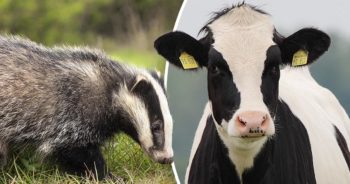22 May 2023
Document calls for an immediate rethink of policy relating to the disease in England, which its authors say is cruel, wasteful and “fundamentally wrong” – but Defra dismisses its claims.

The culling of badgers to combat bTB has been condemned as “one of the greatest veterinary errors of our time” following the release of a new report.
The document has called for an immediate rethink of policy relating to the disease in England, which its authors say is cruel, wasteful and “fundamentally wrong”.
The claims have been dismissed by Defra, which insists the policy has contributed to a sharp fall in disease levels, as the long-standing scientific deadlock on the issue continues.
But one of the report’s authors, Tom Langton, argued scientists had a duty to campaign against “wrongdoing in their field” and questioned the response of other bodies to the subject.
He said: “Researchers with no vested interests have given their own time freely to identify and expose one of the greatest veterinary errors of our time.
“Some established institutions and associations should take a hard look at their impartiality and decide if they are properly following scientific principles, and the extent to which vested commercial interests are driving their positions and thinking.”
More than 210,000 badgers are now believed to have died since the controversial culling programme began a decade ago.
Although field trials of a new cattle vaccination and skin test are currently ongoing, and moves have been made to support badger vaccination efforts, there has been no sign of a change of heart within Government on the merits of culling despite the demands of scientists, former civil servants, and environmental and welfare campaigners, among others.
The latest report, entitled “A bovine tuberculosis policy conundrum in 2023”, examines an approach known as epidemiological culling (EC), which has been adopted on a trial basis in parts of England over the past five years.
Defra has insisted that, as the focus of its policy turns towards the vaccination of both cattle and badgers, culls would only be ordered where epidemiological assessments suggest they are needed.
But critics claim that approach could enable the killing of badgers to continue indefinitely and say similar reductions in disease levels to those in England have been achieved in Wales without culling.
The report, compiled by a team of seven scientists, veterinarians and epidemiologists, said its analysis of an EC area in Cumbria showed that approach had not demonstrated any disease control benefits.
It also argued the disease cannot be fully brought under control without effective test, trace and lockdown procedures for cattle, and would remain a “massive burden” for all concerned parties, as well as the public finances, for as long as such measures are not in place.
The paper continued: “A thorough rethink is required to redress a decade of misinformation and poor epidemiological analysis within APHA, and related veterinary bodies.
“This must challenge a culture that simply assumes major badger involvement in the bTB epidemic and act to re-inform the sector.
“As the national crisis deepens, it is demonstrably clear that the management of bTB, as practiced over the past decade, needs substantial and immediate reform.”
In response, Defra claimed that a review of evidence conducted by senior officials suggested bTB levels in cull areas were reduced by 45% after three years of activity and 50% after four years.
The department insists the final licences for intensive culling activity have already been issued and argued a “phased transition” away from culls was needed to maintain the progress made to this point.
A spokesperson said: “Our bovine TB eradication strategy has led to a significant reduction in this insidious disease.
“Building on the progress made, we are now able to move on to the next phase of the long-term eradication strategy, including wider badger vaccination, alongside improved cattle testing and work towards deployment of a cattle vaccine.
“We have always been clear we do not want to continue the current badger cull longer than necessary.”
But the report has been welcomed by the Progressive Veterinary Association (PVA), which highlighted the cull as one of its main areas of concern when it was launched last November.
One of the group’s directors, Iain McGill, collaborated with Mr Langton and another of the current report’s authors, Mark Jones, from the wildlife charity Born Free, on a paper published last year that concluded culling had no effect on bTB levels.
In a statement, the PVA said: “This report is comprehensive and shines a light on the available evidence in relation to proposed ‘epidemiological culling’ of badgers.
“Firm evidence to support culling badgers simply isn’t there – particularly in the manner proposed of ‘epidemiological culling’.
“What is simple, in a complex minefield, is that cattle vaccination and effective pre-movement testing protocols would be key solutions to England’s bTB problem.”